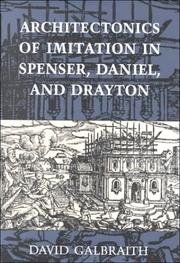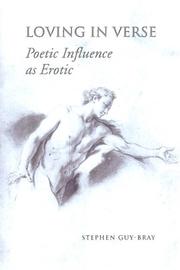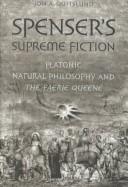| Listing 1 - 3 of 3 |
Sort by
|

ISBN: 9786612037115 1282037110 1442670940 9781442670945 9780802044518 0802044514 6612037113 9781282037113 Year: 2000 Publisher: Toronto
Abstract | Keywords | Export | Availability | Bookmark
 Loading...
Loading...Choose an application
- Reference Manager
- EndNote
- RefWorks (Direct export to RefWorks)
Exploring the boundaries between poetry and history on three of England's epic literary works, Galbraith argues that they enter into a dialogue with classical and contemporary predecessors with implications for understanding the English Renaissance.
English poetry --- Literature and history --- Historical poetry, English --- History and criticism. --- History --- Spenser, Edmund, --- Epic poetry, English --- Epic poetry, Latin --- Imitation in literature. --- Renaissance --- History and criticism --- Roman influences. --- Appreciation --- Faerie queene (Spenser, Edmund) --- England. --- Edmund Spenser, The Faerie queene (Spenser, Edmund) --- Faerie queen (Spenser, Edmund) --- Faery queen (Spenser, Edmund) --- Angleterre --- Anglii͡ --- Anglija --- Engeland --- Inghilterra --- Inglaterra

ISBN: 1281992127 9786611992125 1442676841 0802092039 0802080456 9781442676848 9780802092038 9781281992123 Year: 2006 Publisher: Toronto
Abstract | Keywords | Export | Availability | Bookmark
 Loading...
Loading...Choose an application
- Reference Manager
- EndNote
- RefWorks (Direct export to RefWorks)
Using concepts from queer theory and close readings of images and allusions in these texts, Loving in Verse demonstrates the importance of homoeroticism to an examination of poetic influence. A discussion of the theories of poetic influence from four twentieth-century writers (T.S. Eliot, Harold Bloom, Roland Barthes, and Frank O'Hara) concludes Guy-Bray's analysis."--Jacket. "Loving in Verse examines how three poets present their relationship to their most important predecessors, beginning with Dante's use of Virgil and Statius in the Divine Comedy, moving on to Spenser's use of medieval English poets in the Faerie Queene, and finally addressing Hart Crane's use of Whitman in The Bridge. In each case, Guy-Bray shows how the younger poet presents himself and the older poet as part of a male couple. He goes on to demonstrate how male couples are, in fact, found throughout these poems, and while some are indeed familial or hostile, many are romantic or sexual.
LITERARY CRITICISM --- Poetry --- Homosexuality in literature --- Literature - General --- Languages & Literatures --- History and criticism --- Homosexuality in literature. --- Poetry. --- Dante Alighieri, --- Spenser, Edmund, --- Crane, Hart, --- History and criticism. --- Criticism --- Poems --- Verses (Poetry) --- Literature --- Philosophy --- Faerie queene (Spenser, Edmund) --- Divina commedia (Dante Alighieri) --- Bridge (Crane, Hart) --- Cumégia (Dante Alighieri) --- Divine comedy (Dante Alighieri) --- Divina comedia (Dante Alighieri) --- Commedia (Dante Alighieri) --- Comedy (Dante Alighieri) --- Poema sacro (Dante Alighieri) --- Comedia (Dante Alighieri) --- Edmund Spenser, The Faerie queene (Spenser, Edmund) --- Faerie queen (Spenser, Edmund) --- Faery queen (Spenser, Edmund)

ISBN: 1282014285 9786612014284 1442680113 9781442680111 0802035051 9780802035059 Year: 2001 Publisher: Toronto
Abstract | Keywords | Export | Availability | Bookmark
 Loading...
Loading...Choose an application
- Reference Manager
- EndNote
- RefWorks (Direct export to RefWorks)
Quitslund argues that Spenser sought authority for his poem by grounding its narrative in a divinely ordained natural order, intelligible in terms derived from the ancient sources of poetry and philosophy.
English poetry --- Philosophy of nature in literature. --- Neoplatonism in literature. --- Greek influences. --- Spenser, Edmund, --- Plato --- Immerito, --- Spencer, Edmund, --- Spenser, Edmond, --- Platon --- Aflāṭūn --- Aplaton --- Bolatu --- Platonas --- Platone --- Po-la-tʻu --- Pʻŭllatʻo --- Pʻŭllatʻon --- Pʻuratʻon --- Πλάτων --- אפלטון --- פלאטא --- פלאטאן --- פלאטו --- أفلاطون --- 柏拉圖 --- 플라톤 --- Платон --- プラトン --- Philosophy. --- Influence. --- Faerie queene (Spenser, Edmund) --- Edmund Spenser, The Faerie queene (Spenser, Edmund) --- Faerie queen (Spenser, Edmund) --- Faery queen (Spenser, Edmund)
| Listing 1 - 3 of 3 |
Sort by
|

 Search
Search Feedback
Feedback About UniCat
About UniCat  Help
Help News
News